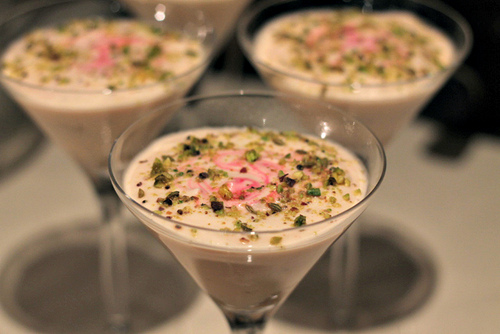Desserts and sweets, we were told, are commonly received as gifts in Pakistan, ubiquitous at celebrations such as weddings where the recipients are sometimes literally fed them, one after the other.
Sumayya Jamil’s gift to us came in the form of her Decadent Desserts and Street Snacks masterclass, held on a sunny Saturday afternoon, at London’s Central Street Cookery School. Thankfully, on this occasion, no force-feeding was required.
Sumayya, aka Pukka Paki, clearly adores food and Pakistani cuisine. She explained that, despite the overwhelming abundance of food during her upbringing, it has continued to dominate her life since settling in the UK, leading, earlier this year, to her quitting her full-time job as a commercial lawyer to devote her livelihood toward it.
Despite a traditional culinary education at the hands of her mother and grandmother, Sumayya can’t resist applying her own twists to many dishes and in particular desserts which, she explains, allow her the freedom to experiment and get really creative. This is something that thankfully hasn’t offended the ‘old guard’ , with Madhur Jaffery singing her praises and a Pukka Paki recipe due to feature in Jaffery’s upcoming cookery book.
As we perused the recipes for the class, trying to ignore the pending surge of insulin proved tricky. First up Barfi, a kind of Pakistani-style fudge, traditionally made with a type of condensed milk known as Khoya or Mawa, was made here using Carnation caramel condensed milk for a Dulce de Leche twist and given the coconut treatment for added decadence.
My personal twist was to burn the mixture in the pan resulting in a decidedly darker and chewier fudge than my classmates but, which, like all happy accidents turned out to be “everyone’s favourite” (not my words but then neither Sumayya’s, for that matter). These sweets traditionally come adorned with silver leaf, a bit of ‘bling’ that would have provided my burnt Barfi with some aesthetic assistance.
Picking up momentum, with lessons learnt, we prepared a refreshing ground rice pudding, traditionally an Arabic dish popular in Pakistan and India, known as Firni or Phirni but commonly referred to as Kheer. Regional variations apply, as always, but essentially this is made by boiling ground rice with milk and sugar. For this version, all the stops were resolutely yanked out with condensed milk and ricotta cheese used in the main mixture, which was then flavoured with ground almonds, cardamom, saffron, and a choice of either rose water, rose essence or screw pine water. Most opted for rose essence as the most intense flavour but the screw pine proved a pleasingly subtle concession to a gutsy pudding.
Traditionally, this dish is served in unglazed terracotta bowls, which imparts an earthy flavour and helps cool it right down. We made individual portions in standard stoneware bowls but Sumayya reserved a communal portion in unglazed terracotta so we could taste the difference for ourselves, which, although subtle, did ensure the pudding was refreshingly cooler; no doubt crucial when faced with an onslaught of glucose.
Next up was Zarda, a traditional Persian dish, again made with rice and condensed milk, which in this case is reduced to a thick, crumbly consistency and known as Khoya. Another mishap occurred (not mine this time) – Sumayya salvaged a watery rice mixture by covering the pan with a dish cloth, which absorbs excess moisture. All results were pleasing to the eye and taste buds, given, as per this recipe, the ‘rainbow’ treatment with food colouring and scattered with nuts, candied fruit and dessicated coconut.
Street snacks took the form of pomegranate, ricotta and green chilli samosas, a decidedly Middle-Eastern twist, and okra pakoras with chaat masala, which someone referred to as ‘Pakistani tempura’. Both provided a much needed savoury element to an odyssey of sugar, all of which we enjoyed al fresco, with an appropriately ‘Indian Summer’ (sorry, ‘Pakistani Summer’) in full effect.
Cocktails provided liquid and the most renegade of today’s twists. Sumayya had explained that with a Muslim majority prohibiting alcohol, the people of Pakistan celebrate with food instead, so our tamarind, vodka and pomegranate; and lychee, gin and red chilli concoctions were not only uniquely brilliant but felt deliciously rebellious.
At the last minute, Sumayya took full responsibility in making these dissident delights but, along with the pakoras, demonstrated their preparation. Everything else was gratifyingly hands-on with a mixture of individual prep and team work. We each ended up with name-tagged desserts as, clearly, some things are to precious to share but in true Pakistani celebration style, our spoons were dipped in and out of each other’s dishes as we chin-wagged our way through an intense sugar-high.
The food, drink, company and our host were all fantastic and desserts less sweet and rather more nuanced than expected. How much of this was down to Sumayya’s interpretations is hard to fathom, as unfamiliar as most of us were with these dishes, but we were ensured that the less rich and starchy the better, as these traditionally follow-up meat-heavy barbecues, a common food event in Pakistan.
The ultimate aim of Pukka Paki is to demonstrate the sheer diversity of Pakistani food, separate from Indian cuisine, which it is all too commonly lumped in with. Sumayya’s classes are a fantastic introduction to this and take place in various prestigious UK cookery schools, but she also offers private tuition. Her website is an ‘Aladdin’s Cave’ of tantalising recipes and those wishing to have the experience without the graft can pop along to one of her regular supper clubs. A sweet tooth is required.
Pukka Paki cookery courses cost around £55 for three hours.

